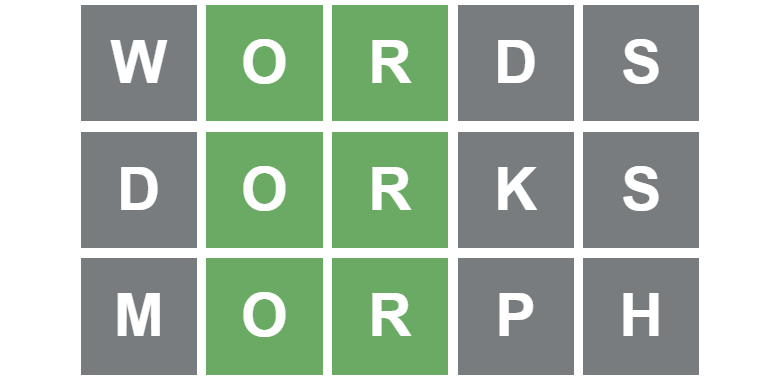Wordle review

What is it? A word puzzle of the highest quality.
Expect to pay Nothing!
Release date Out now
Developer Josh Wardle
Publisher The New York Times, eventually
Reviewed on Google Chrome
Multiplayer? I don’t know how to answer that question.
Link Official site
The cult of Wordle grows by the day. The game came into our lives under the cover of darkness, slowly contaminating my Twitter timeline since late 2021, promising nothing more than a puzzle that can be solved somewhere between 30 seconds or 15 minutes. You get six guesses to identify a five-letter word, and with each entry the algorithmic quizmaster reveals what letters are in the right space, what letters appear in the word but are slotted incorrectly, and what letters aren’t in the solution at all. (For instance, today I went from TRACE, to RIPEN, before landing on PERKY.) This is the sort of premise you’d expect to find on the back of tedious in-flight magazines, marooned alongside half-finished Sudoku grids, solved with a ballpoint pen in the clouds above Missouri. And yet, Wordle is an absolute phenomenon. I’ve been playing religiously for a month straight and have no interest in slowing down. It is an early Game of the Year favorite, neck and neck with Elden Ring.
It’s difficult to say whether Wordle’s incredible success has more to do with its metacultural community than its gameplay principles. I mean, at its core, this is a great puzzle. The story goes that Wordle’s creator, a former Reddit software engineer named Josh Wardle, dreamt up the design to be a private ritual shared between him and his word game-loving wife. The two would go back and forth, solving the riddles in cloistered marital bliss, long before Wordle seeped out into the internet. But it is also true that Wordle is not an original idea. The game show LINGO basically operated with the same gimmick back in the mid-2000s, and if you are a veteran of languid after-school programs, you’ve likely suffered through some mind-numbing rounds of Mastermind while waiting for your dad to pick you up. (Mastermind subbed in letters for different colored pegs, but the overarching strategy was identical.)

(Image credit: Josh Wardell)
In that sense, Wordle’s ascent is pure chaos theory. Nobody could’ve predicted the zeitgeist; it is simply a matter of being in the right place at the right time. The tides of virality are forever inscrutable, and sometimes it can lift up a musty old cipher to the top of the trending page.
But I don’t think Wordle’s lack of inventiveness really matters. Strangely enough, Wordle’s core appeal can be found in its magnificently ameliorating social vibes. Sitting down in front of my Wordle feels like getting pricked with a tranquilizing dart because, quite frankly, it’s difficult to untether any cultural artifact from the global catastrophes of the last two years. I started playing Wordle last December, in the dead heat of the Omicron wave; right as all of our daffy, post-pandemic euphoria was being humbled by the Almighty Variants. We were all back at square one, and I doubt I’m the only one who recalls that time as the ultimate nadir of our bleak, everlasting, recursive Covid journeys. Much like the many other pandemic phases, (sourdough starter, The Last Dance, guilt-free day drinking,) Wordle encapsulates a sense of effortless, blissed-out peace at a time when we’re all thirsty for it. Josh Wardle saliently added a share function to the end of every solution, which means that social media feeds are speckled with green, yellow, and gray boxes—almost like a way to compare notes with fellow Wordleheads. Some people deride that feature, comparing it to the darkest Farmville days on Facebook. But personally? I relish the chance to avoid discourse surrounding the virulent disease or the death of democracy, and instead simply discuss the daily word with the other strangers trickling through my feed.
I can’t think of many other video games that are pure of heart. Animal Crossing probably qualifies, but that’s also a franchise saddled with a rhapsodically depressing free-to-play mobile version laden with an infinite supply of nickel-and-diming microtransactions. Maybe Stardew Valley counts? But that game also has one of the more vibrant NSFW communities on Reddit. (Don’t say I didn’t warn you.) Wordle, on the other hand, is a product that exists completely out of time. There is only one puzzle every day, a philosophy that discourages players from falling down a rabbit hole of fidgety procrastination. Ideally that mindset will persist now that the game has been acquired by The New York Times. The reporting thus far says that Wordle will remain free for everyone, so fingers crossed. Don’t harsh the vibes, Gray Lady.
Wordle’s ascent is pure chaos theory. Nobody could’ve predicted the zeitgeist.
Because in an atmosphere where every Fun Good Thing is immediately plundered for profits—as Blizzard desperately scavenges for avenues to charge players for the fundamentally non-monetizable Hearthstone Mercenaries—Wordle must continue to be a rare font of positive energy. That’s a concept so alien to our guarded sensibilities that when it’s in the palm of our hands, it becomes downright miraculous.
I tend to solve the daily Wordle at midnight, right when the new grid is uploaded, or in the early morning when my girlfriend and I aren’t quite ready to start the day yet. I’ll tell her how many guesses it took me, and she’ll try to beat my score on our lunch break. We debate opening guesses, letter combinations, and tricky answers—the breezy Wordle Meta that has surfaced in the wake of the mania—but neither of us tweet our scores out too often anymore. Instead, the game has become another part of our routine, akin to her decaf brew or my bodega runs. Wordle wants a little bit of our time, and then it lets us go about our days. In the muck of 2022, all I’m looking for is a reliable bright spot.

